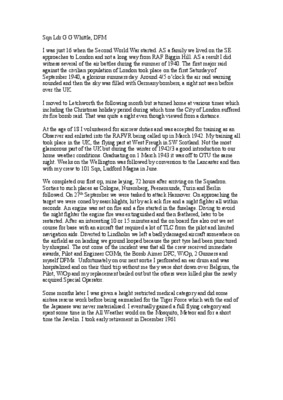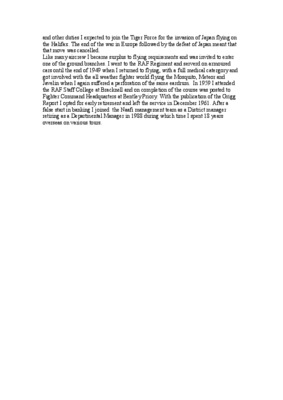Sqn Ldr G G Whittle, DFM
Title
Sqn Ldr G G Whittle, DFM
Description
An incomplete memoir written by Geoffrey Whittle starting at age 16. At age 18 he volunteered for aircrew duties and trained at RAF West Freugh. He converted to Wellingtons then Lancasters and moved to RAF Ludford Magna in June 1943. Over Hanover they were badly damaged by anti-aircraft fire and a night fighter. They brought the aircraft back to RAF Lindholme. The crew were awarded immediate awards for their bravery. Despite a perforated ear drum which grounded him for six months he gained full flying category and continued in the RAF until 1961.
Creator
Language
Format
Two typewritten sheets
Publisher
Rights
This content is available under a CC BY-NC 4.0 International license (Creative Commons Attribution-NonCommercial 4.0). It has been published ‘as is’ and may contain inaccuracies or culturally inappropriate references that do not necessarily reflect the official policy or position of the University of Lincoln or the International Bomber Command Centre. For more information, visit https://creativecommons.org/licenses/by-nc/4.0/ and https://ibccdigitalarchive.lincoln.ac.uk/omeka/legal.
Identifier
BWhittleGGWhittleGGv3, BWhittleGGWhittleGGv4
Transcription
Sqn Ldr G G Whittle, DFM
I was just 16 when the Second World War started. AS a family we lived on the SE approaches to London and not a long way from RAF Biggin Hill. AS a result I did witness several of the air battles during the summer of 1940. The first major raid against the civilian population of London took place on the first Saturday of September 1940, a glorious summers day. Around 4/5 o’clock the air raid warning sounded and then the sky was filled with Germany bombers, a sight not seen before over the UK.
I moved to Letchworth the following month but returned home at various times which including the Christmas holiday period during which time the City of London suffered its fire bomb raid. That was quite a sight even though viewed from a distance.
At the age of 18 I volunteered for aircrew duties and was accepted for training as an Observer and enlisted into the RAFVR being called up in March 1942. My training all took place in the UK, the flying part at West Freugh in SW Scotland. Not the most glamorous part of the UK but during the winter of 1942/3 a good introduction to our home weather conditions. Graduating on 1 March 1943 it was off to OTU the same night. Weeks on the Wellington was followed by conversion to the Lancaster and then with my crew to 101 Sqn, Ludford Magna in June.
We completed our first op, mine laying, 72 hours after arriving on the Squadron. Sorties to such places as Cologne, Nuremberg, Peenemunde, Turin and Berlin followed. On 27th September we were tasked to attack Hannover. On approaching the target we were coned by searchlights, hit by ack ack fire and a night fighter all within seconds. An engine was set on fire and a fire started in the fuselage. Diving to avoid the night fighter the engine fire was extinguished and then feathered, later to be restarted. After an interesting 10 or 15 minutes and the on board fire also out we set course for base with an aircraft that required a lot of TLC from the pilot and limited navigation aids. Diverted to Lindholm we left a badly damaged aircraft somewhere on the airfield as on landing we ground looped because the port tyre had been punctured by shrapnel. The out come of the incident was that all the crew received immediate awards, Pilot and Engineer CGMs, the Bomb Aimer DFC, W/Op, 2 Gunners and myself DFMs. Unfortunately on our next sortie I perforated an ear drum and was hospitalized and on their third trip without me they were shot down over Belgium, the Pilot, W/Op and my replacement bailed out but the others were killed plus the newly acquired Special Operator.
Some months later I was given a height restricted medical category and did some air/sea rescue work before being earmarked for the Tiger Force which with the end of the Japanese war never materialised. I eventually gained a full flying category and spent some time in the All Weather world on the Mosquito, Meteor and for a short time the Javelin. I took early retirement in December 1961
[page break]
and other duties I expected to join the Tiger Force for the invasion of Japan flying on the Halifax. The end of the war in Europe followed by the defeat of Japan meant that that move was cancelled.
Like many aircrew I became surplus to flying requirements and was invited to enter one of the ground branches. I went to the RAF Regiment and serverd on armoured cars ontil the end of 1949 when I returned to flying, with a full medical catergory and got involved with the all weather fighter world flying the Mosquito, Meteor and Javelin when I again suffered a perforation of the same eardrum. In 1959 I attended the RAF Staff College at Bracknell and on completion of the course was posted to Fighter Command Headquarters at Bentley Priory. With the publication of the Grigg Report I opted for early retirement and left the service in December 1961. After a false start in banking I joined the Naafi management team as a District manager retiring as a Departmental Manager in 1988 during which time I spent 18 years overseas on various tours.
I was just 16 when the Second World War started. AS a family we lived on the SE approaches to London and not a long way from RAF Biggin Hill. AS a result I did witness several of the air battles during the summer of 1940. The first major raid against the civilian population of London took place on the first Saturday of September 1940, a glorious summers day. Around 4/5 o’clock the air raid warning sounded and then the sky was filled with Germany bombers, a sight not seen before over the UK.
I moved to Letchworth the following month but returned home at various times which including the Christmas holiday period during which time the City of London suffered its fire bomb raid. That was quite a sight even though viewed from a distance.
At the age of 18 I volunteered for aircrew duties and was accepted for training as an Observer and enlisted into the RAFVR being called up in March 1942. My training all took place in the UK, the flying part at West Freugh in SW Scotland. Not the most glamorous part of the UK but during the winter of 1942/3 a good introduction to our home weather conditions. Graduating on 1 March 1943 it was off to OTU the same night. Weeks on the Wellington was followed by conversion to the Lancaster and then with my crew to 101 Sqn, Ludford Magna in June.
We completed our first op, mine laying, 72 hours after arriving on the Squadron. Sorties to such places as Cologne, Nuremberg, Peenemunde, Turin and Berlin followed. On 27th September we were tasked to attack Hannover. On approaching the target we were coned by searchlights, hit by ack ack fire and a night fighter all within seconds. An engine was set on fire and a fire started in the fuselage. Diving to avoid the night fighter the engine fire was extinguished and then feathered, later to be restarted. After an interesting 10 or 15 minutes and the on board fire also out we set course for base with an aircraft that required a lot of TLC from the pilot and limited navigation aids. Diverted to Lindholm we left a badly damaged aircraft somewhere on the airfield as on landing we ground looped because the port tyre had been punctured by shrapnel. The out come of the incident was that all the crew received immediate awards, Pilot and Engineer CGMs, the Bomb Aimer DFC, W/Op, 2 Gunners and myself DFMs. Unfortunately on our next sortie I perforated an ear drum and was hospitalized and on their third trip without me they were shot down over Belgium, the Pilot, W/Op and my replacement bailed out but the others were killed plus the newly acquired Special Operator.
Some months later I was given a height restricted medical category and did some air/sea rescue work before being earmarked for the Tiger Force which with the end of the Japanese war never materialised. I eventually gained a full flying category and spent some time in the All Weather world on the Mosquito, Meteor and for a short time the Javelin. I took early retirement in December 1961
[page break]
and other duties I expected to join the Tiger Force for the invasion of Japan flying on the Halifax. The end of the war in Europe followed by the defeat of Japan meant that that move was cancelled.
Like many aircrew I became surplus to flying requirements and was invited to enter one of the ground branches. I went to the RAF Regiment and serverd on armoured cars ontil the end of 1949 when I returned to flying, with a full medical catergory and got involved with the all weather fighter world flying the Mosquito, Meteor and Javelin when I again suffered a perforation of the same eardrum. In 1959 I attended the RAF Staff College at Bracknell and on completion of the course was posted to Fighter Command Headquarters at Bentley Priory. With the publication of the Grigg Report I opted for early retirement and left the service in December 1961. After a false start in banking I joined the Naafi management team as a District manager retiring as a Departmental Manager in 1988 during which time I spent 18 years overseas on various tours.
Collection
Citation
Geoffrey Whittle, “Sqn Ldr G G Whittle, DFM,” IBCC Digital Archive, accessed July 22, 2024, https://ibccdigitalarchive.lincoln.ac.uk/omeka/collections/document/10582.
Item Relations
This item has no relations.


